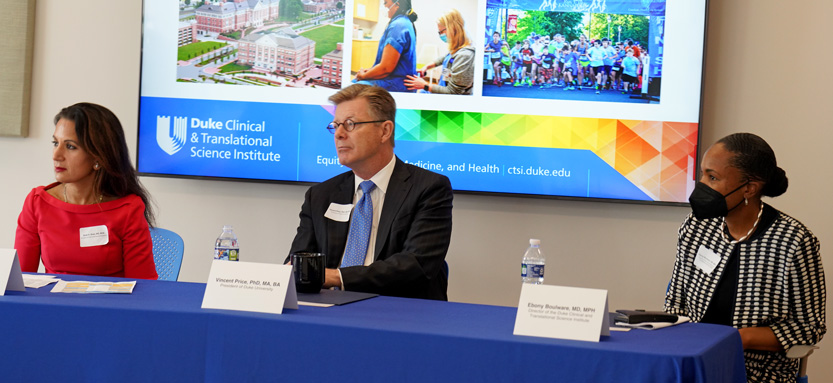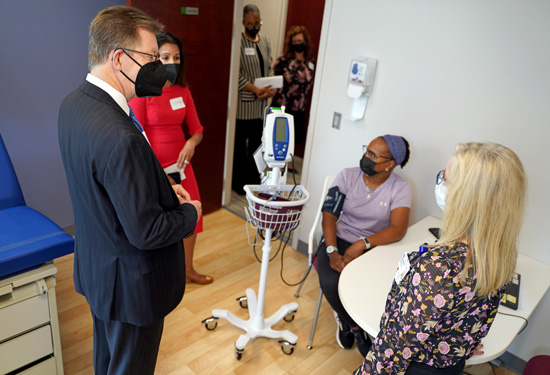
KANNAPOLIS, NC—Duke University President Vincent E. Price visited Duke’s clinical research office at the North Carolina Research Campus in Kannapolis today. Duke Kannapolis demonstrates Duke’s commitment to advancing community health and improving lives across the state.
During roundtable discussions with Duke collaborators, local leaders, and study participants, Price spent his historic visit learning more about the unique research facility that has enrolled nearly 14,000 volunteers in dozens of studies using a successful community-engaged research model. Duke Kannapolis is a part of the Duke Clinical and Translational Science Institute (CTSI).
“Through community-based research and partnerships, Duke Kannapolis is on the forefront of population health research,” said Price, 10th president of Duke University and the first to visit Duke Kannapolis. “I am very grateful for the community leaders in Kannapolis and across the state who are strengthening Duke’s research and education missions to serve North Carolinians.”
Newly appointed Duke Kannapolis Director Svati H. Shah, MD, MHS, welcomed Price to Duke Kannapolis, which was founded in 2007 by Robert Califf, M.D., Duke adjunct professor of medicine and commissioner of the U.S. Food and Drug Administration.
“I am so grateful for the time President Price gave us today to hear our story, see for himself the amazing work that’s happening here, and meet the extraordinary people who make this work a success,” she said. “Our partnership with our community in Kannapolis and Cabarrus County remains a vital and essential component of our success at Duke Kannapolis.”
Most Essential Component
Shah, who was recently tapped to lead Duke Kannapolis by CTSI Director L. Ebony Boulware, MD, MPH, shared her vision with Price to continue expanding work in omics, precision medicine, and population health with an increased focus on digital health, artificial intelligence, and genomic medicine to accelerate the translation of research to improved patient care.
While she builds new partnerships both within Duke and at the North Carolina Research Campus, Shah said the most important partner for Duke Kannapolis will remain the community itself.
“Our partnership with you, our community collaborators in Kannapolis and Cabarrus County, is the single most essential component of our success,” she told local leaders and study participants. “With your vision in reimagining the quality of life for your community, there is more for us to do and accomplish together.”
Community stakeholders at the event included representatives from the City of Kannapolis, City of Concord, Cabarrus Health Alliance, and El Puente Hispano, as well as participants in studies ranging from COVID-19 research to low back pain. Elected leaders included N.C. Rep. Kristin Baker.

Clinical Research Flourishes
Special guest Deepak Kumar, PhD, represented North Carolina Central University, where he directs the Julius L. Chambers Biomedical/Biotechnology Research Institute and serves as the scientific leader of research facilities in Kannapolis and Durham. Duke and NCCU have an ongoing partnership, including the Duke-NCCU Bridge Office.
Duke collaborators included principal investigators for two studies based at Duke Kannapolis — Opeyemi Olabisi, MD, PhD, who leads the Duke APOL1 Research Biorepository, and Adam Goode, PT, DPT, PhD, who leads the Transitions Low Back Pain study — as well as Susanna Naggie, MD, MHS, Vice Dean for Clinical Research, and Doug Heron, Associate Vice President for Duke State Relations. They were joined by other leaders from CTSI and the Office of the President.
As leader of the CTSI, Boulware thanked the Kannapolis team for ensuring that clinical research continues to flourish at Duke, noting that knowledge gained through research will ultimately improve the health of communities.
“Not only is vital clinical research taking place here, but our CTSI team in Kannapolis always places study participants at the center of everything they do,” Boulware said. “This community-based approach is the gold standard, and investigator after investigator tells me of their remarkable experience working with this team on grants, projects, and initiatives.”
Promoting Healthier Communities
After touring the Appalachian State University Human Performance Laboratory and UNC Nutrition Research Institute, Price ended his four-hour visit noting the remarkable transformation of Kannapolis, home for more than a century to a massive textile mill shuttered in 2003 during the largest single layoff in North Carolina history. Today, the city is thriving and growing, focused on health, research, and innovation, and the North Carolina Research Campus stands where Cannon Mills once stood.
“I am very proud of the extraordinary research conducted at Duke Kannapolis,” Price said. “The collaborative, community-based approach is an innovative model to address the most pressing challenges and promote healthier and more equitable communities in North Carolina and beyond.”
Home for more than a century to a massive textile mill — shuttered in 2003 in the largest single layoff in North Carolina history — Kannapolis is transforming itself into a thriving city focused on health, research, and innovation. The 350-acre North Carolina Research Campus rises where Cannon Mills once stood.
In 2015, the City of Kannapolis purchased the downtown district and launched a revival strategy inspired by the revitalization of downtown Durham, complete with a $52 million minor league ballpark. The City’s $133 million public investment has attracted $240 million in private investment, and people are returning to the former mill town. Between 2010 and 2020, the population increased from 42,625 to 53,114 people. Kannapolis straddles Cabarrus and Rowan counties.

New Chapter of Collaboration
The cornerstone of the Duke Kannapolis infrastructure is the MURDOCK Community Registry and Biorepository, a groundbreaking longitudinal study that enrolled 12,526 community members and collected over 400,000 annotated biospecimens. A new initiative is underway to convert the MURDOCK Biorepository into rich datasets by making thousands of biospecimens and associated clinical outcome data available to all Duke researchers. Complete this brief interest form as a first step.
The MURDOCK Study paved the way for other major research initiatives at Duke Kannapolis, including the Project Baseline Health Study, which in 2017 launched a new chapter of collaboration and innovation led by Shah, the Duke principal investigator. Partners include Verily Life Sciences and Stanford Medicine.
Duke Kannapolis features a diverse community of engaged research participants, considered valued partners. Study teams work to ensure that cohorts are representative of the community, and Duke Kannapolis recruitment features demographic and socioeconomic diversity. Many participants co-enroll in more than one study, with 22,339 total enrollments by 13,886 unique participants so far.
A unique research facility that functions as an engine to accelerate population health research supporting the Duke research community, Duke Kannapolis manages a wide variety of research projects focusing on the exploration, discovery, and validation of biomarkers that will inform a deeper understanding of health and disease. Duke Kannapolis offers a broad range of assets and capabilities for investigators.
About Duke Kannapolis
Founded in 2007 on the North Carolina Research Campus, Duke Kannapolis has enrolled nearly 14,000 participants using a successful community-based engagement. A part of the Duke Clinical and Translational Science Institute, Duke Kannapolis manages a wide variety of research projects focusing on the exploration, discovery, and validation of biomarkers that will inform a deeper understanding of health and disease. Our facility functions as an engine to accelerate population health research, supporting the Duke research community and external collaborators and partners. For more information, visit ctsi.duke.edu/duke-kannapolis.
About Duke CTSI
The Duke Clinical and Translational Science Institute (CTSI) catalyzes and accelerates the innovation and translation of scientific discoveries into health benefits for patients and communities through collaborative research. Our NIH Clinical and Translational Science Award (CTSA) funding enables us to offer programs, project management and navigator services, and data sharing and informatics resources that provide essential support to move ideas from the laboratory through early-phase clinical trials, and facilitate education for current and future translational medicine researchers. For more information, visit ctsi.duke.edu.